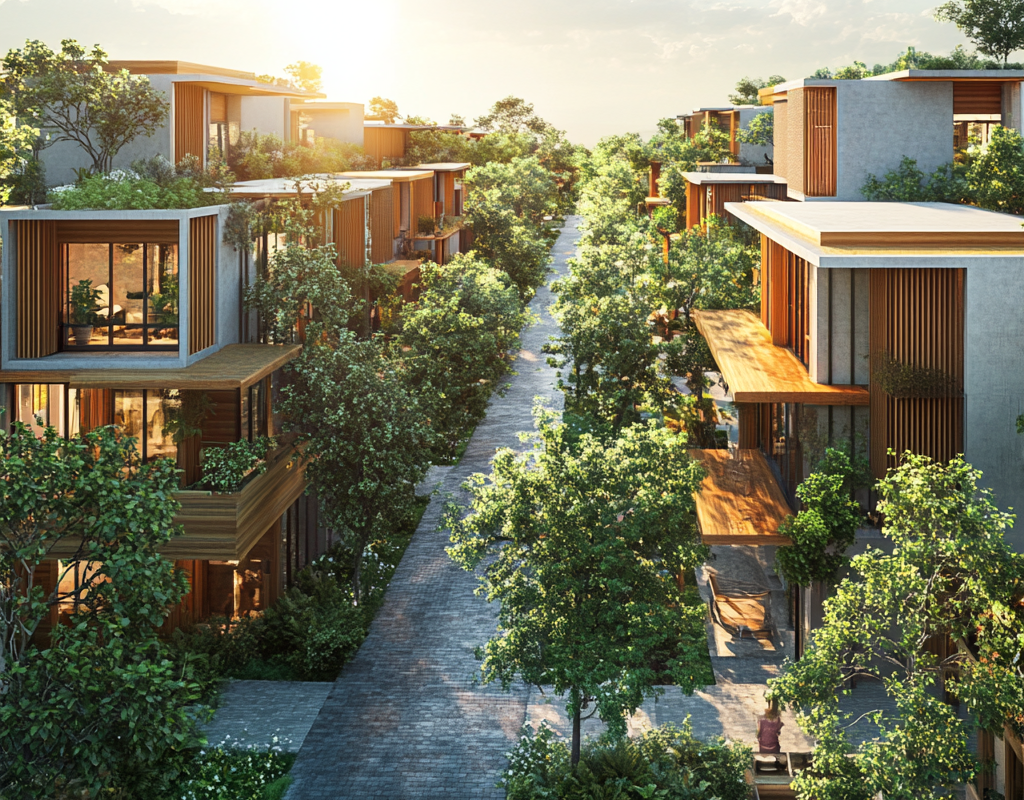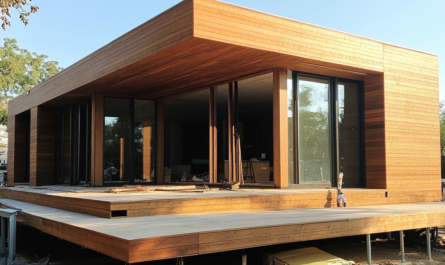Principles of eco-towns: what makes them unique
Eco-towns are unique settlements where priority is given to environmental sustainability, harmony with nature and high standards of living. Their architecture and layout are aimed at minimizing environmental impact, using renewable resources and preserving natural landscapes. Such towns are often located in picturesque places with clean ecology, which makes them ideal for living away from noisy cities.
The basis of eco-towns are people with common values, focused on caring for the environment. Here it is important not only to build houses from environmentally friendly materials, but also to create conditions for interaction between residents. Eco-towns involve joint decision-making, collective resource management and the development of social projects aimed at improving the quality of life of everyone.
Green construction: materials and technologies
Construction in eco-towns is based on the use of environmentally friendly and healthy materials. Wood, clay, straw, stone and recycled resources ensure not only the durability of buildings, but also their energy efficiency. For example, houses made of straw bale or clay have high thermal insulation properties, which allows you to keep warm in winter and cool in summer, minimizing energy costs.
In addition to the use of natural materials, advanced technologies are being introduced in eco-towns. These can include solar panels, wind generators and rainwater harvesting systems that provide autonomy for residents. Smart technologies are also actively used: automatic control systems for light, ventilation and heating help optimize resource consumption and reduce costs.
Healthy lifestyle in eco-towns
Eco-towns create ideal conditions for leading a healthy lifestyle. There is no place for the polluted atmosphere, noise and stress typical of big cities. Clean air and the absence of harmful emissions improve overall health, and closeness to nature helps cope with emotional fatigue and increases happiness.
Residents actively engage in sports, organize walking, cycling and group outdoor activities. Growing organic products is also widespread in eco-towns. Most families have their own gardens where they grow fresh vegetables, fruits and herbs, which helps ensure a healthy diet and reduces dependence on industrial food.
Energy efficiency and renewable energy sources
One of the key characteristics of eco-towns is the use of renewable energy sources. Solar panels provide electricity, wind turbines generate additional energy, and geothermal systems are used for heating. Such technologies make eco-towns autonomous and sustainable even in the context of a global energy crisis.
Energy-saving technologies are being introduced at every stage – from the construction of houses to their operation. For example, modern insulation, low-e windows and smart energy management systems can reduce heat loss and reduce resource consumption. This not only improves the environmental situation, but also significantly reduces residents’ utility costs.
Social interaction and sustainable communities
Eco-towns are not just settlements, but real communities of like-minded people, where every resident plays an important role. Events aimed at improving infrastructure and improving the quality of life, such as cleanup days, environmental events and educational seminars, are often held here. This helps people unite and solve common problems together.
Residents of eco-towns have access to common spaces: parks, recreation areas, sports grounds and educational centers. Such interaction contributes to the formation of friendly relations, strengthening trust and creating a favorable atmosphere. In such settlements, everyone feels part of a large and close-knit community, which makes life more rich and meaningful.
Economic and environmental benefits of living in eco-towns
Eco-towns provide a unique opportunity to live comfortably and environmentally friendly, uniting modern technologies and closeness to nature. They save resources, minimize environmental damage and improve the quality of life. Let’s look at the main advantages that such settlements offer.
- Reduced utility costs. By using renewable energy sources such as solar panels and wind turbines, residents save significant money. Energy-efficient technologies help minimize costs for heating, lighting and water supply.
- Possibility of growing your own products. In eco-towns, vegetable gardens and farms are widespread, where you can grow vegetables, fruits and herbs. This reduces dependence on store-bought products and allows you to eat organic food.
- Promoting health and reducing medical costs. Clean air, organic nutrition and outdoor physical activity have a positive impact on the health of residents, reducing the risk of disease and associated costs.
- Preservation of the environment. Minimum carbon footprint, use of recyclable materials and rational consumption of resources help preserve nature for future generations.
- Improving quality of life. Living in a quiet, green environment with the opportunity to interact with nature and like-minded people makes life more harmonious and satisfying.
Eco-towns represent a future that combines human comfort with care for the environment. They provide economic benefits, environmental sustainability and a high quality of life, making them an ideal choice for those seeking harmony with nature.
Questions and answers
Answer 1: These are settlements focused on harmony with nature, environmental sustainability and comfortable living.
Answer 2: Solar panels, wind generators, rainwater harvesting systems and smart resource management systems are used.
Answer 3: Clean air, freedom from pollution, and access to organic foods improve health and well-being.
Answer 4: They reduce the carbon footprint, reduce dependence on external resources and reduce energy costs.
Answer 5: Residents participate in common activities, use common spaces, and form sustainable communities.




